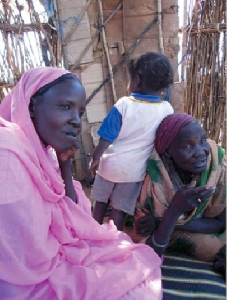
Contact: John Davisonon, 020 7523 2416, 07802 502155; Dominic Nutt, 020 7523 2427 / 07720 467680; Karen Hedgeson, 020 7523 2404, 0781 4539040; all with Christian Aid
MEDIA ADVISORY, May 14 /Standard Newswire/ -- At least 1 billion people will be forced from their homes between now and 2050 as the effects of climate change deepen an already burgeoning global migration crisis, predicts a new report by Christian Aid.
Photo: Halima Abdulrahman Mamoud (left) has been living with her family at an IDP camp at Zamzam, in northern
These future migrants will swell the ranks of the 155 million people already displaced by conflict, disaster and large-scale development projects. The vast majority will be from the world's poorest countries. Urgent action by the world community is needed if the worst effects of this crisis are to be averted, says Human tide: the real migration crisis.
"We believe that forced migration is now the most urgent threat facing poor people in the developing world," says John Davison, the report's lead author.
Published to mark Christian Aid Week 2007, the report warns that the world is now facing its largest ever movement of people forced from their homes. The predicted numbers of displaced people could dwarf even those left as refugees following the Second World War.
The impact of climate change is the great, frightening unknown in this equation. Only now is serious academic attention being devoted to calculating the scale of this new human tide. Even existing estimates, more than a decade old, predict that hundreds of millions of people will be forced from their homes by floods, drought and famine sparked by climate change.
Security experts fear that this new migration will fuel existing conflicts and generate new ones in the areas of the world – the poorest – where resources are most scarce. A world of many more Darfurs is the increasingly likely nightmare scenario.
Most of those on the move will have to remain in their own countries – often at the mercy of the very governments which caused them to flee in the first place. These "internally displaced persons", or "IDPs", have no rights under international law and no official voice. Their living conditions are likely to be desperate and in many cases their lives will be in danger.
While the situation in Darfurhas received a lot of media attention, most other recent coverage has focused on economic migrants and asylum seekers, says the report.
"We hear a lot about people trying to come to
The Christian Aid report has been welcomed by some of the world's leading experts on forced migration and displacement.
Dennis McNamarais Special Adviser to the UN Emergency Relief Co-ordinator, and Director of the Inter-Agency Division on Displacement in the United Nations Office for the Coordination of Humanitarian Affairs.
"Tens of millions of the poorest people in the poorest parts of the world are uprooted and lack basic assistance and protection. They are the world's voiceless and often inaccessible refugees," says McNamara. "As Christian Aid's welcome new report says, their numbers can destabilise whole regions and may be an obstacle to building peace. Their problems must be urgently addressed, both for humanitarian as well political and security reasons."
Jens-Hagen Eschenbaecheris acting head of the Internal Displacement Monitoring Centre in
"Often at the mercy of governments that are not willing or capable to protect them, internally displaced people are among the most vulnerable victims of conflict," says Eschenbaecher. "The global crisis of internal displacement is one of the great challenges of our time."
Dr Roberta Cohenis former co-director of the Project on Internal Displacement at the Brookings Institution,
"That tens of millions of people are forcibly uprooted within their own countries is both a terrible human tragedy and a threat to worldwide stability," says Dr Cohen. "Christian Aid does an immense service in recognising climate change as a major factor underlying this growing crisis."
Case studies in the report spell out in human detail how major internal migration crises have already developed in
In
Malilies in the
The report marks the 50th anniversary of Christian Aid Week, the UKand Ireland's first and largest door-to-door charity fundraising collection. The organisation, then called Christian Reconstruction in
Dennis McNamara and Jens-Hagen Eschenbaecher will launch the report Human tide: the real migration crisis at a specially constructed IDP camp on London's South Bank (Riverside walkway, between National Theatre and Gabriel's Wharf) at 6.30pm on Monday 14 May 2007. There will be a press call at 11am when Dennis McNamara and the report's authors will be available for interviews. Roberta Cohen will be available for telephone interviews in advance of the launch.
A downloadable PDF version of the report is available at www.christianaid.org.uk/indepth/705caweekreport




 Sign Up to Receive Press Releases:
Sign Up to Receive Press Releases: